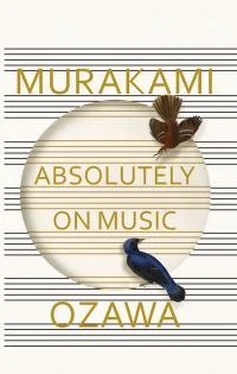MURAKAMI: The Gould we heard before doesn’t glide along smoothly like that, either. It’s got a pretty hard sound. Do you think it was something that American listeners preferred?
OZAWA: No, not really.
MURAKAMI: But the sound is radically different.
OZAWA: You know how people say that the sound of an orchestra changes with the conductor? That tends to be truer of American orchestras.
MURAKAMI: You mean, European orchestras don’t change that much?
OZAWA: You can put a different conductor in front of the Berlin or the Vienna, and the musicians hardly let go of their own special coloration.
MURAKAMI: But all kinds of people took over the New York Philharmonic after Bernstein left—Zubin Mehta, Kurt Masur …
OZAWA: And Pierre Boulez …
MURAKAMI: I never got the impression the sound of the orchestra changed all that much.
OZAWA: No, I suppose not.
MURAKAMI: I heard the New York Philharmonic a few times playing under other conductors, but it wasn’t all that impressive. Why do you think that is?
OZAWA: Well, Lenny wasn’t the kind of conductor who used rehearsals to train the orchestra intensively.
MURAKAMI: He was busy doing his own thing.
OZAWA: Hmm, I guess so—a certain kind of genius. Training the orchestra was just not one of his strong points. He was an outstanding educator, that’s for sure, but he probably wasn’t all that suited to the nitty-gritty of imposing discipline.
MURAKAMI: But isn’t the orchestra the same thing for a conductor as literary style is for a novelist? It’s natural for a writer to want to perfect his style, so wouldn’t a conductor naturally want to work on improving his style? At least he demanded a certain level of performance from them, I suppose?
OZAWA: Yes, of course he did.
MURAKAMI: Is it a question of “direction” of the sort we were discussing before?
OZAWA: Yes, to some extent, but Lenny never taught them how to play.
MURAKAMI: Never taught them how to play?
OZAWA: How to play their instruments. He didn’t pay a lot of attention to the ensemble approach. Maestro Karajan always used to do that.
MURAKAMI: Practically speaking, what’s involved in the “ensemble approach”?
OZAWA: It’s all about how you go about making the orchestra sound as an ensemble. Lenny didn’t—couldn’t—teach us that. By nature. He had a different kind of genius.
MURAKAMI: Are you saying that he couldn’t provide practical guidance—“Do this,” “Do that”—when he had the musicians there, right in front of him, playing their instruments?
OZAWA: Practically speaking, a good conductor, a professional, instructs his musicians. He’ll say, “Listen to this instrument right here,” and “Now listen to this instrument,” and the sound of the orchestra comes together.
MURAKAMI: And each time he does that, then, the musicians concentrate on listening to one instrument, then another …
OZAWA: Exactly: “Now listen to the cello.” “Now listen to the oboe.” Like that. Maestro Karajan was an absolute genius on that front. He would make these points very clearly to the musicians during rehearsal. Lenny could never train an orchestra that way. Or rather, it never really interested him.
MURAKAMI: But he must have had a sound in mind that he wanted the orchestra to produce, didn’t he?
OZAWA: Yes, he did, of course.
MURAKAMI: But he couldn’t create that sound through his conducting.
OZAWA: And the weird thing is, Lenny was such an outstanding educator. For example, when he delivered the Norton Lectures at Harvard, he did all the necessary preparation for them and delivered a marvelous series of lectures. They’re famous. They were made into a book. But in dealing with an orchestra, where you’d expect him to do the same sort of thing, he didn’t. He had no concept of “teaching” an orchestra.
MURAKAMI: That is weird.
OZAWA: And he was the same with us assistants. We thought of him as our teacher and wanted to learn from him, but he didn’t see it that way. You are my colleagues, he used to tell us, so if you notice something that needs correcting, I want you to tell me about it, and I’ll do the same with you. He had that good American’s desire for equality. The way the system was set up, he was supposed to be the boss, but he insisted that he was not our teacher.
MURAKAMI: Not at all European, was he?
OZAWA: No, not the least bit. And he adopted the same attitude toward the orchestra, so he could never really train the musicians. Or rather, it took a long time to train them to do any one thing. And so, using this egalitarian approach, you wouldn’t have the usual situation where the conductor blows up at the musicians, but just the opposite, with the musicians blowing up at the conductor. I saw it happen on several occasions. And they weren’t joking around, either: they’d talk right back at him in all seriousness. This was inconceivable with other orchestras.
I had a similar kind of thing happen to me much later on, after we started up the Saito Kinen Orchestra. Most of the members of that orchestra were old friends of mine. There aren’t too many of them left now, but the first ten years or so, the others would tell me exactly what they thought straight to my face. That was the kind of atmosphere we had, but some people hated it. Musicians who came from the outside. They couldn’t get used to it. They’d complain that it would take forever if we worked out every little thing that way. I was the maestro, after all: I didn’t have to let every single musician have his say. But that was exactly what I wanted to do. I used to make a point of asking them to tell me what they thought.
In Lenny’s case, though, he wasn’t dealing with an orchestra made up of friends who came together of their own volition to play together but rather an old, established professional organization. When he treated them as equals, one thing after another would come up, so rehearsals took much longer than they had to. I can’t tell you how many times I saw this happen.
MURAKAMI: They wouldn’t just do what he told them.
OZAWA: I suppose he was trying to be a “good American,” and maybe sometimes he overdid it.
MURAKAMI: Egalitarianism aside, I’m sure he felt terribly frustrated if he couldn’t actually get the orchestra to produce the sound he wanted.
OZAWA: I’m sure he did. Everybody called him “Lenny.” They call me by my first name, too, but it was way more extreme with him. Some musicians would assume, as a result, that they could get away with anything, and they’d yell stuff like, “Hey, Lenny, that must be wrong.” Keep that up, and your rehearsals won’t go anywhere. They won’t end on time, for one thing.
MURAKAMI: No, but I imagine you get some real excitement and some great music when things go well—and kind of a mess when things don’t.
OZAWA: True. The music can lose its coherence. That would happen now and then. Back when Saito Kinen was just getting started, we had people calling me “Seiji” and people calling me “Mr. Ozawa,” and people calling me “Maestro.” It was pretty confusing. That’s when it struck me—it must have been like this for Lenny.
MURAKAMI: I don’t suppose it was like that with Maestro Karajan.
OZAWA: No, he never listened to anybody. If the sound he wanted and the sound the orchestra was producing were different, it was strictly the orchestra’s fault. He’d make them do it over and over until they played the way he wanted it.
MURAKAMI: All very clear and precise.
OZAWA: In Lenny’s case, the musicians would talk with each other during rehearsals. That always bothered me. So during my rehearsals in Boston, if somebody started talking, I would stare straight at them, and the private conversations would stop. Lenny would never do that.
Читать дальше











